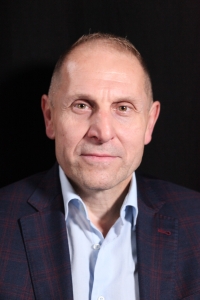Nobody was sure of a place in the national team

Download image
Hockey player Bedřich Ščerban was born on 31 May 1964 in Jihlava. His father, Bedřich Ščerban, an electrician, had Ruthenian-German roots, his father came from Subcarpathian Rus, his mother from the Jihlava German community and most of her relatives were deported to Germany after the war. Bedřich started playing hockey at the age of four and soon joined the hockey school. After studying at the Secondary Industrial School of Mechanical Engineering, he decided to pursue a career as a professional hockey player and entered basic military service in Dukla Jihlava, where he continued as a hockey player and active duty soldier thereafter. In the second half of the 1980s, he became a member of the national team, with which he participated in the Calgary Olympics (1988). In November 1989, as captain of Dukla Jihlava, he read a statement from the hockey players expressing support for the striking students before a game at the stadium. In 1991, he was awarded the Golden Hockey Stick award and was also hired by the Finnish club Tappara Tampere. His career continued in Sweden (Brynäs Gävle) and Germany (Essen, Freiburg). At the end of his career he played for Czech clubs in Beroun and Třebíč. Since 2008 he has been the managing director of Dukla Jihlava and pushed for the construction of a new hockey arena.
